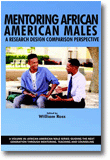
Mentoring African American Males
A Research Design Comparison Perspective
Edited by:
Dr. William Ross, Prairie View A&M University
A volume in the series: African American Male Series: Guiding the Next Generation Through Mentoring, Teaching and Counseling. Editor(s): Adriel A. Hilton, Southern University at New Orleans.
Published 2014
Mentoring African American Males provides important black male research and student performance data to guide the efforts of those who accept the enormous task of standing in the gap to increase black male achievement. Dr. Ross provides guidance for individuals and institutions embracing the important role of developing mentoring programs or serving as a mentor to youth. However, what makes Dr. Ross’ work such a critically important book for any individual or institution considering such a role is its insight into the social-cultural framework within which mentoring must occur at every level from elementary school through college. Equally insightful is the structure that such programs must take in response to the socio-cultural constructs of the families, communities, and institutions where they will occur.
There are far more quantitative studies than qualitative on the topic of mentoring. This text addresses that discrepancy and provides the results of several qualitative studies on African American males. There is hardly any that offer a mixed method perspective that combine quantitative and qualitative methodological approaches. This text reports on the research results that are qualitative in nature in addition to some that are from a quantitative and mixed method approach.
CONTENTS
Acknowledgements and Dedication. Forward, William Ross. Introduction, Lucian Yates, III. SECTION 1: QUANTITATIVE RESEARCH. A Mentoring Model to Increase Diverse Educational Leaders: The Effectiveness of Mentoring for Novice Educational Leaders, Pamela Barber-Freeman. Necessary Partnership: Mentoring and Academics, John Gray. The Impact of Mentoring on African American Males Who Test into Remedial Courses at a Predominantly White Community College, Leonard C. Bass. SECTION 2: QUALITATIVE RESEARCH. A Phenomenological Investigation on the Role of Mentoring in the Academic Development of African American Male Secondary Students, Jillian Inge. “Can You Help Me?” Exploring the Influences of a Mentoring Program on High School Males of Color Academic Engagement and Self-Perceptions in School, Curtis Lewis. African American Males, Mentoring, Sense of Community, and the Strength of Fictive Kinships, John Leonard Mason, Jr. Paying It Forward: Black Men in a Predominantly Latino Community, James McKeever. The Rising Tide Lifts All Boats: Uncovering the Experiences of Academically Successful African American Male High School Students, Nicole Patrice Allain. A Case Study of Mentor-to-mentee Program to Help African American Males Graduate from High School, Mary E. Jenkins-Williams and Peter P. Kiriakidis. SECTION 3: MIXED METHODS RESEARCH. Implementing a Mentoring Program for African American Males to Improve Student Satisfaction at a Predominantly White Institution, Curtis C. Coonrod. Conclusion: Mentoring African American Male Students, Pamela Barber-Freeman. About the Authors.
-
Paperback9781623968014
Web price: $45.04 (Reg. 52.99)
-
Hardcover9781623968021
Web price: $80.74 (Reg. 94.99)
- eBook9781623968038

- EDU000000 - EDUCATION: General
- SOC001000 - SOCIAL SCIENCE: ETHNIC STUDIES: African American Studies
- EDU037000 - EDUCATION: Research
-
 (Re)Envisioning Social Studies Education Research
Current Epistemological and Methodological Expansions, Deconstructions, and Creations
(Re)Envisioning Social Studies Education Research
Current Epistemological and Methodological Expansions, Deconstructions, and Creations
-
 Black Males in Postsecondary Institutions
Examining Their Experiences in Diverse Institutional Contexts Ten Years Later
Black Males in Postsecondary Institutions
Examining Their Experiences in Diverse Institutional Contexts Ten Years Later
-
 Black Women Mothering & Daughtering During a Dual Pandemic
Writing Our Backs
Black Women Mothering & Daughtering During a Dual Pandemic
Writing Our Backs
-
 Counseling African American Males
Effective Therapeutic Interventions and Approaches
Counseling African American Males
Effective Therapeutic Interventions and Approaches
-
 Distance Learning
Volume 20 #3
Distance Learning
Volume 20 #3
-
 Distance Learning
Volume 20 #4
Distance Learning
Volume 20 #4
-
 Qualitative Research With Diverse and Underserved Communities
Qualitative Research With Diverse and Underserved Communities

